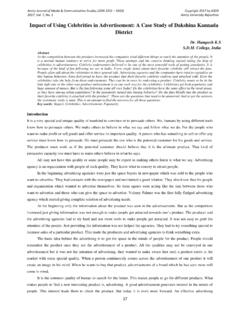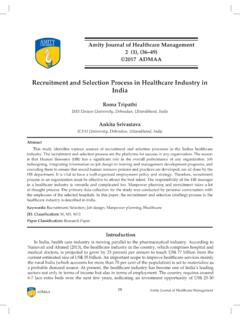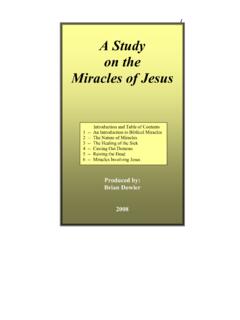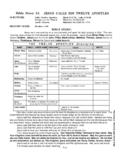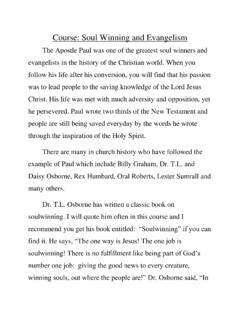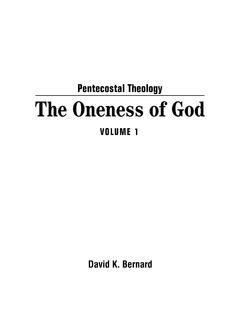Transcription of Understanding the Importance of Study of Tourist Behaviour ...
1 17 Amity Research Journal of Tourism, Aviation and Hospitality Vol. 01, issue 02, July-Dec 2016 Understanding the Importance of Study of Tourist Behaviour and its Relevance in Growth of Tourism: A Study of Elements Influencing Tourist Behaviour Dr. Sandeep Guleria Vice Principal, ITFT College, Chandigarh Abstract Tourism is one of the most dynamic industries. In this, many factors are associated with it, which lead it to grow. There is one of the major factor without which the existence of tourism cannot be thought of. And that factor is ' Tourist ' or consumer in this industry. The ups and downs in the industry depend mainly on consumer, who is also known as the king in any business.
2 So, Study of consumer behavior in tourism projects the growth, trend and future of tourism industry. The term ' consumer behavior ' is defined as the behavior that consumers display in searching for purchasing; using evaluating and disposing of products and services that one will satisfy their needs. Consumer behavior focuses on how individuals make decisions to spend their available resources (time, money, effort) on consumption related items. The present paper suggests some of the elements which influence the Tourist behavior and ultimately effects the tourism generation of the region.
3 Key words: Consumer Behaviour , Travel motivation, Tourist decision making process, Tourist satisfaction, Travel Pattern Introduction The topic of Tourist behavior depends upon, interacts with, and occasionally determines other components of tourism. Tourist behavior is powerfully connected to and often contingent upon marketing activities: it strongly shapes the wellbeing of many small businesses, and it can generate considerable socio-cultural and environmental impacts. What tourists do, and why they do it has fascinated a lot of people. What tourists think, how they feel and what influences their thoughts and feelings is especially fascinating to tourists themselves, to the people who manage their behavior and to analysts studying contemporary life.
4 One of the common questions for this kind of research is who is interested or concerned with Tourist behavior. The answers provided identified an array of interested parties: tourists themselves, Tourist business operators, public management agency personnel, tourism researchers and analysts and, occasionally, media figures and politicians. This kind of broad answer to such a basic question has shaped the range of topics and studies. Further, it allowed the presentation of key topics to vary and hence meet some different kinds of needs likely to be expressed by interested parties.
5 By way of contrast, few people in the Tourist business are likely to be overly concerned with how much tourists learn, or what skills they develop during travelling, whereas interpretive officers working in public management agencies might find this to be core information that helps them appraise their own performance. In a less functional mode, tourists themselves may be quite interested in their own ability to cope in a cross-cultural encounter, and find it rewarding to analyse their experiences and read about and compare them with them 18 Amity Research Journal of Tourism, Aviation and Hospitality Vol.
6 01, issue 02, July-Dec 2016 with the adventures and misadventures of others. There are several critical dimensions that create differences between Tourist behavior and consumer behavior. One such major difference lies in the extended phases that surround Tourist activities. Clawson and Knetsch (1966) identified five such phases. They noted: (1) and anticipation or pre-purchase (2) a travel to the site segment, (3) an on-site experience, (4) a return travel component, and (5) an extended recall and recollection stage. Consumer behavior, as a field of inquiry with its own journals, text-books and courses, is centrally focused on the choices of products and the satisfaction with products.
7 In each phase of Tourist behavior outlined by Clawson and Knetsch, some differences from the standard consumer behavior studies can be noted. In the first anticipation phase, many tourists plan for the fantasize about their forthcoming travel for months, sometimes years ahead. While this might be similar for the purchase of a motor vehicle, it is somewhat absurd when applied, for example, to purchase hair shampoo or groceries. Models of behavior built on the latter examples are unlikely to be relevant to Tourist behavior. For both the travel to the site and the return travel phases of Tourist behavior there is no sensible analogy in the consumer behavior literature.
8 Yet, the anticipatory elements of Tourist experiences are heightened by the need to access the visited location and such travel is often an integral part of the total experience. Further, and from a business perspective, the expenditure that travelers must make to access the on-site experience. Another marked difference between much consumer behavior and Tourist behavior is that the latter is a part of a very social business. Tourism is a people-to-people business in both its consumption and its production. Tourists are frequently with others, and often jointly decide upon and frequently share their Tourist experience.
9 The businesses that serve tourists (the hotels, the airlines, the tour operators, the attractions) and the larger visited community (who are sometimes passive extras in the total tourism production) are inherently performers on a social stage (Crang, 1997). It is therefore important to treat models of consumer behavior built on non-social modes of production and consumption with some caution if attempts to extrapolate them to Tourist choice and satisfaction are attempted. There is also a view that the Study of Tourist behavior is rally market research.
10 There is a considerable interest in tourism studies in the analysis of markets. Nevertheless much of the published tourism work is reflective and contains more ideas to understand both the segments identified and the marketing implications than studies done within the commercial consultancy world. For example academic research studies in tourism markets have incorporated such ideas as convergence and divergence of segments (Pizam, 1999a), cross-cultural market variability (Richards & Richards, 1998), and the discriminatory power of different segmentation approaches (Moscardo, Pearce & Morrison, 1996).


